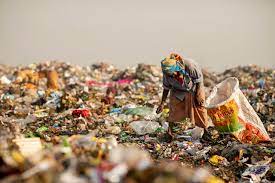Waste pickers in Bulawayo have raised concerns about several provisions in the proposed Solid Waste Management By-law, arguing that they are outdated and could hinder their operations.
The Matabeleland Institute for Human Rights (MIHR), a waste picker advocacy group, has highlighted several sections of the by-law that remain unchanged from the 1979 version, potentially stifling the waste pickers’ livelihoods.
The Bulawayo City Council (BCC) recently invited public feedback on the proposed by-law, prompting MIHR to urge the local authority to consider the significant contributions of waste pickers to the city’s economy.
MIHR Coordinator Khumbulani Maphosa emphasised the need to integrate waste pickers into the proposed Solid Waste Management Bylaw (2023) and the Environmental Management Bylaw (2023).
This integration, Maphosa explained, would legitimise waste pickers’ operations and promote a circular waste economy in Bulawayo, aligning with the government’s National Development Strategy 1 (NDS1) and the BCC’s vision of a smart and transformative city.
MIHR also drew attention to the bylaw’s silence on electronic waste (e-waste), with only one passing mention. The organisation called for the inclusion of e-waste management provisions in the bylaw, acknowledging the growing e-waste problem in Zimbabwe and globally.
Maphosa specifically pointed to Section 13, which declares domestic refuse as the property of the Council. This section, he noted, has been used to delegitimize and victimize waste pickers.
“We recommend that the section be amended to incorporate waste pickers or there be clarity in the by-law on how the Director gives permission to interfere with domestic refuse,” he said.
“Section 22 on industrial waste – we propose that may the clause also demand for waste management plans from industries and commercial companies such as wholesalers. Section 23 (1) on event waste: may it also compel political events to submit a waste management plan just like sporting, entertainment, cultural and religious events.”
MIHR recommended amending the section to incorporate waste pickers or providing clear guidelines for the director’s authorization to interfere with domestic refuse.
Section 22 on industrial waste – we propose that may the clause also demand for waste management plans from industries and commercial companies such as wholesalers. Section 23 (1) on event waste: may it also compel political events to submit a waste management plan just like sporting, entertainment, cultural and religious events.”
He added that Section 28 (6) on entry to waste disposal facility – the clause as it is may debar waste pickers who survive from the landfill site.
“We propose that the clause be edited and read “without the permission of the Director, no person other than an employee of Council and members of registered/recognized/organized waste picker groups. Section 32 (1) (d) on waste reduction and recycling – this section may disenfranchise the waste pickers. Waste pickers are picking for livelihood but the “profit” component of the clause is vague and may be a disadvantage to waste pickers. Either that needs to be clarified or it clearly exempt waste pickers so that it’s clear they are not affected,” he said.
“Section 32 (1) (d) on waste reduction and recycling – because of the critical role of waste pickers in the City’s solid waste management, we propose that should they be compelled to register, may they be exempted for paying any fees to Council for registration. This will be the City’s recognition of the critical role of waste pickers in enabling the City to manage its solid waste. The waste pickers are already doing a service to the City.”


Leave a comment